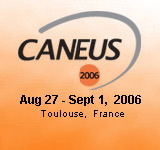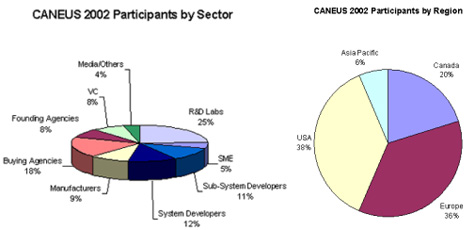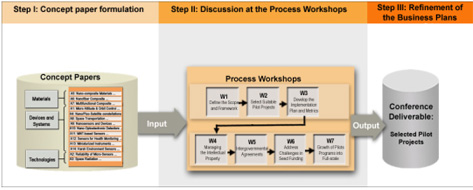|
CANEUS 2006 AT GLANCE: |
| Conference Overview >>> |
 |
|
 |
| Conference Program >>> |
 |
|
 |
|
| Pilot Projects Concept Papers |
The purpose of the process workshops is to evaluate the pilot projects, which emerged out of the CANEUS 2004 Conference. Out of the 14 concept papers from CANEUS 2004, seven have been selected to be developed into prototypes. |
The End Users Committee will define the end user customer requirements and provide input for each project. The committee members will act on the advisory board to monitor the pilot projects leading to their successful completion. |
For more information on CANEUS Pilot Projects please click here! |
About Caneus 2006
The biennial CANEUS Conference and Workshop is the world's premier international forum devoted to MNT development for aerospace applications. CANEUS aims to overcome the obstacles to transitioning mostly laboratory-proven MNT technologies to systems by putting in place an end-to-end technology development pipeline. By bringing together technology developers, end users and investors from Canada, the United States, Europe, Japan, and South Korea CANEUS aims to forge partnerships that will ensure the effective transitioning of aerospace MNT from a mostly conceptual stage to system-level implementations.
Two hundred and sixty members of the global MNT community attended the first CANEUS conference, held in Montreal, Canada in 2002. CANEUS 2004 held in November in Monterey, California and built on the foundations and themes laid out in 2002. The CANEUS 2004 conference in Monterrey, CA succeeded in generating tremendous interest within Canada, Europe, the US and Japan for the development of a smoothly functioning technology development pipeline. A call for promising MNT concepts at the CANEUS 2004 Conference resulted in the submission and evaluation of 14 innovative concept topics. These concept papers are currently being transformed into coherent business plans, as per step 3 of Phase I - and will ultimately lead to the development of system-level prototypes.
CANEUS is a shining example in bringing together the world community to find rapid, cost-effective ways to transition emerging Micro-Nano-Technology (MNT) concepts to Aerospace applications by developing system-level prototypes.
CANEUS Structure
|
CANEUS 2002 |
Spanning a period of five days from August 25-30, 2002, the workshop comprised 27 sessions. The areas covered in the workshop were space, defense, aeronautics, geophysics and environmental control.
|
|
CANEUS 2004 |
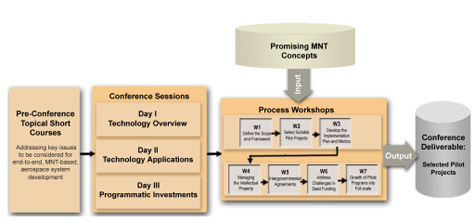
The CANEUS 2004 conference will include: 6 pre-conference short courses, 22 thematic conference sessions, 7 process workshops covering 14 concept studies that identify potential pilot projects, 3 poster sessions, and relevant technical exhibits.
|
|
CANEUS 2006 |
- Format will be consistent with CANEUS 2004 and will consist of 3 days of Conference covering the topics related to the MNT Technology Development Pipeline and 2 days of Workshops to debate issues related to Concept Papers/Pilot Projects funded prior to the conference.
- Speakers at Conference sessions and Workshop Panels will be world experts and by invitation only.
- Short courses (1 day) on relevant topical areas will be conducted prior to the start of the conference. They will provide the technical background in key areas pertinent to the conference.
- Technical exhibitions will cover the state-of-the-art in MNT related tools and resources as well as end-user' applications.
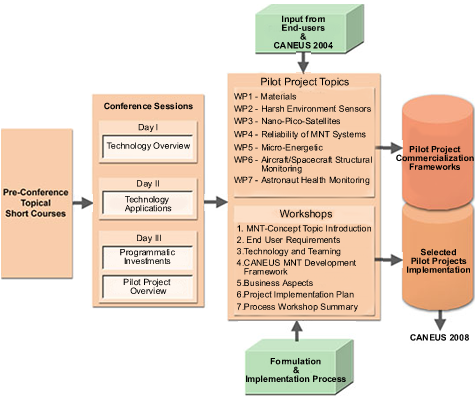
|
|
CANEUS 2002 |
Spanning a period of five days from August 25-30, 2002, the workshop covered 27 sessions with approximately 100 invited speakers from Australia, Austria, Belgium, Canada, France, Germany, Italy, Japan, Netherlands, Spain, Switzerland, UK, and the USA. In addition to these presentations, we were fortunate to hear from two Nobel Laureates, Prof. Richard Smalley and Prof. John C. Polanyi. With representation from over 200 of the world's leading authorities in aerospace and industrial R&D, as well as in the MNT research and investment sectors, the workshop provided a truly unique opportunity for technology exchanges and networking amongst participants and attendees representing a wide cross-section of industry, universities and government agencies. A series of outings, industrial tours and networking opportunities rounded out the event.
|
|
|
The CANEUS 2004 conference will conclude with the development of "blueprints" for a set of Aerospace MNT development pilot projects that will lead to the production of system-level prototypes. These pilot projects will benefit from the coordinated efforts of the participating organizations that bring complementary skills and resources. CANEUS is working in close collaboration with senior government officials to develop innovative funding means tailored to fit the needs of projects that cross international boundaries.
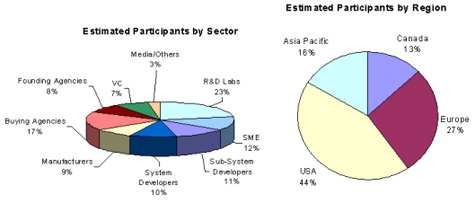
|
|
CANEUS 2002 |
The outcome of CANEUS 2002 included recommendations for future actions to be taken by governmental policy makers from the participating CANEUS countries as follow:
- Set up inter-governmental agreements that will serve as the basis for future collaborations and ensure the free flow of Aerospace MNT among participating countries.
- Identify the areas of complementary, core expertise within each nation which can be seamlessly integrated into the “technology pipeline” for Aerospace MNT.
- Develop both a ground-based and space-based MNT reliability testing protocol that will benefit from the Space technology pipeline.
- Implement low cost, rapid launch space testing opportunities that can advance Space MNT development far more quickly than is currently the case. In this way, there is the dual benefit of sooner realizing the Return-on-Investment (ROI) as well as “building in” reliability and robustness into Space MNT at a relatively early stage of development.
|
|
CANEUS 2004 |
The CANEUS 2004 conference will conclude with the development of "blueprints" for a set of pilot projects aimed at practical Aerospace MNT development trough to the level of a high-level system prototype. The pilot project document provides future investors, whether agency program managers or venture capitalists, with an authoritative and comprehensive plan for technology development. Promising concepts have been solicited in fourteen MNT topical areas (see below) spanning materials, devices and technologies. The Concept Papers will be prepared in advance of the CANEUS 2004 conference and will be discussed at the process workshops during the latter half of the conference. The pilot project “blueprints” are developed using the following step-by-step approach (see schematic below):
|
|
|
|

